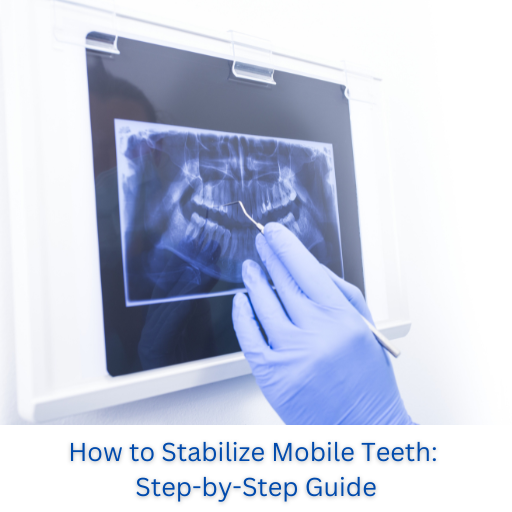Having mobile or loose teeth can be a concerning dental issue, but with the right steps and dental care, you can work towards stabilizing them. In this comprehensive guide, we will explore effective techniques and strategies for mobile teeth stabilization, teeth stability, and preventing tooth mobility. Discover the steps to stabilize loose teeth and manage mobile teeth for improved dental health.

SUMMARY
A. Stabilise Mobile Teeth: Understanding Dental Care for Tooth Stability
1. Mobile Teeth Stabilization Techniques:
2. Teeth Stability Strategies:
3. Mobile Teeth Treatment Options:
B. Steps to Stabilise Loose Teeth: A Comprehensive Guide
Step 1: Consultation with a Dentist:
Step 2: Establishing Proper Oral Hygiene:
Step 3: Lifestyle Adjustments:
Step 4: Customised Treatment Plan:
A. Stabilise Mobile Teeth: Understanding Dental Care for Tooth Stability
1. Mobile Teeth Stabilisation Techniques:
Mobile teeth stabilization involves a combination of dental techniques. From lifestyle adjustments to professional interventions, understanding the various stabilization techniques is the first step toward healthier teeth.
Mobile teeth stabilization techniques encompass a diverse range of dental interventions and lifestyle adjustments that collectively contribute to the restoration of healthier teeth. This comprehensive approach acknowledges that addressing the issue of mobile or loose teeth involves not only professional dental treatments but also proactive steps taken by individuals in their daily lives.
Professionally, dental interventions may include procedures like splinting, where loose teeth are stabilized by bonding them to adjacent stable teeth. This helps distribute the forces evenly, preventing further mobility. Additionally, dental professionals may recommend treatments to address the underlying causes of mobile teeth, such as gum disease or bone loss.
On the lifestyle front, individuals can play a crucial role in stabilizing their teeth. Maintaining a diligent oral hygiene routine, including regular brushing and flossing, helps control bacterial growth and reduces the risk of gum disease. Avoiding habits like teeth grinding and clenching, which can contribute to tooth mobility, is also essential.
Understanding the multifaceted nature of mobile teeth stabilization empowers individuals to take a proactive role in their oral health. By combining professional dental care with personal lifestyle adjustments, individuals can work towards achieving a stable and healthy dentition, ensuring a confident and functional smile.
2. Teeth Stability Strategies:
Achieving teeth stability requires a strategic approach. Explore effective strategies, including proper oral hygiene practices, dietary considerations, and lifestyle changes that contribute to the overall stability of your teeth.
Teeth stability is a result of a strategic and holistic approach that encompasses various factors, including meticulous oral hygiene practices, mindful dietary considerations, and lifestyle adjustments. Proper oral hygiene is fundamental in maintaining the stability of teeth. Regular brushing and flossing help prevent the accumulation of plaque and bacteria, reducing the risk of gum disease and potential tooth mobility.
Diet plays a crucial role in dental health. A nutrient-rich diet that includes essential vitamins and minerals, particularly calcium and vitamin D, contributes to strong teeth and bones. Conversely, excessive consumption of sugary or acidic foods can erode enamel and compromise tooth stability. Being mindful of dietary choices is integral to sustaining teeth health.
Lifestyle changes also factor into teeth stability. Habits like tobacco use and excessive alcohol consumption can negatively impact oral health and contribute to tooth mobility. Conversely, adopting positive lifestyle choices, such as quitting smoking and moderating alcohol intake, can support overall dental well-being.
Understanding and implementing these strategies collectively contribute to the stability of teeth. It’s a proactive and personalized approach that empowers individuals to take charge of their oral health, fostering a foundation for strong and stable teeth throughout life.
3. Mobile Teeth Treatment Options:
Mobile teeth can result from various dental issues, and the treatment options vary accordingly. Learn about potential dental procedures, such as braces, splints, or crowns, that your dentist may recommend to address tooth mobility.
Mobile teeth, often a consequence of dental issues, necessitate specific treatment options tailored to the underlying causes. Understanding these treatment strategies is crucial for individuals experiencing tooth mobility. Dental professionals may recommend braces as a corrective measure for mobile teeth caused by misalignment or malocclusion. Braces exert gentle pressure to reposition teeth gradually, promoting stability and alignment.
Splints are another viable treatment option for mobile teeth. These are devices that attach to multiple teeth, providing support and preventing excessive movement. Splints can be effective in cases of tooth mobility resulting from trauma or bruxism (teeth grinding).
In certain instances, dental crowns may be recommended to stabilize mobile teeth. Crowns, also known as caps, are placed over the affected tooth to enhance its strength and structure. This can be beneficial for teeth with weakened integrity or fractures contributing to mobility.
Additionally, addressing the underlying dental issues that lead to tooth mobility is crucial. This may involve treating gum disease, managing bruxism, or addressing other oral health concerns that contribute to the instability of teeth.
It’s essential for individuals experiencing tooth mobility to consult with a dentist who can assess the specific causes and recommend a tailored treatment plan. Each case is unique, and a comprehensive approach ensures the most effective and lasting solutions for mobile teeth.
4. Preventing Tooth Mobility:
Proactive dental care plays a crucial role in preventing tooth mobility. Discover preventive measures, including regular dental check-ups, proper oral hygiene habits, and lifestyle adjustments that contribute to maintaining tooth stability.
Preventing tooth mobility requires a proactive approach to dental care, encompassing various preventive measures that contribute to maintaining tooth stability and overall oral health. Regular dental check-ups are a cornerstone of preventive care. Routine examinations allow dentists to detect early signs of dental issues that could lead to tooth mobility. Early intervention can prevent further complications and help maintain the stability of teeth.
Proper oral hygiene habits are paramount in preventing tooth mobility. Regular brushing, flossing, and using an antiseptic mouthwash help remove plaque and bacteria that contribute to gum disease—a leading cause of tooth mobility. Consistent oral care at home, combined with professional dental cleanings, creates a robust defense against dental problems that may compromise tooth stability.
Lifestyle adjustments also play a role in preventing tooth mobility. Avoiding habits like tobacco use and excessive alcohol consumption supports overall oral health. Furthermore, individuals engaged in contact sports or activities that pose a risk of dental trauma should consider using protective gear, such as mouthguards, to prevent injuries that could lead to tooth mobility.
In essence, a holistic approach to dental care that combines regular check-ups, diligent oral hygiene practices, and lifestyle adjustments forms a comprehensive strategy for preventing tooth mobility. This proactive approach fosters optimal oral health and contributes to the long-term stability of teeth.
B. Steps to Stabilize Loose Teeth: A Comprehensive Guide
Step 1: Consultation with a Dentist:
The first step in stabilizing loose teeth is seeking professional advice. A dentist can assess the severity of tooth mobility, identify underlying causes, and recommend an appropriate treatment plan.
Step 2: Establishing Proper Oral Hygiene:
Maintaining good oral hygiene is vital for tooth stability. Follow a consistent oral care routine, including regular brushing, flossing, and using an antiseptic mouthwash to prevent gum disease and tooth mobility.
Step 3: Lifestyle Adjustments:
Certain lifestyle factors, such as smoking and excessive alcohol consumption, can contribute to tooth mobility. Make necessary lifestyle adjustments to promote overall dental health and prevent further tooth instability.
Step 4: Customized Treatment Plan:
Work closely with your dentist to create a customized treatment plan. This may involve dental procedures, orthodontic interventions, or other treatments tailored to address the specific causes of tooth mobility.
Step 5: Follow-Up Care:
Regular follow-up appointments are essential to monitor progress and make any necessary adjustments to the treatment plan. Consistent communication with your dentist ensures ongoing dental care for stable teeth.
FAQ Section
Q1: Can mobile teeth be stabilized without professional help?
A1: While some lifestyle adjustments may contribute to improved tooth stability, it’s crucial to consult with a dentist for a comprehensive assessment and customized treatment plan to address the underlying causes of tooth mobility.
Q2: Are there home remedies for stabilizing loose teeth?
A2:Home remedies, such as maintaining good oral hygiene and making lifestyle adjustments, can contribute to overall dental health. However, professional dental advice is necessary for the effective stabilization of loose teeth.
Q3: How long does it take to stabilize mobile teeth?
A3: The duration of tooth stabilization varies based on the severity of tooth mobility and the chosen treatment plan. Regular follow-up appointments with your dentist will help monitor progress and adjust the treatment as needed.
Q4: Can loose teeth become permanently stable?
A4: With the right dental care and treatment, it’s possible to achieve permanent stability for loose teeth. However, the success of stabilization depends on factors such as the underlying causes and the effectiveness of the chosen treatment plan.
Q5: Is tooth mobility reversible with proper care?
A5:In some cases, tooth mobility can be reversible with proper dental care. Early intervention, adherence to treatment plans, and ongoing dental maintenance contribute to the potential for tooth stability and overall oral health.
In conclusion, stabilizing mobile teeth is a collaborative effort between the individual and dental professionals. By following the steps outlined in this guide and seeking timely dental care, you can work towards achieving tooth stability and maintaining optimal oral health.
Conclusion:
In conclusion, stabilizing mobile teeth is a collaborative effort between the individual and dental professionals. By following the steps outlined in this guide and seeking timely dental care, you can work towards achieving tooth stability and maintaining optimal oral health.
For personalized assistance or to schedule a consultation, don’t hesitate to reach out to our dedicated team at (267) 908-4867. Your smile is our top priority, and we are steadfast in our commitment to providing you with the information and support needed to make your dental experience both comfortable and successful. Trust us to prioritize your oral health journey, and we eagerly anticipate being a partner in your quest for a healthy and radiant smile.








